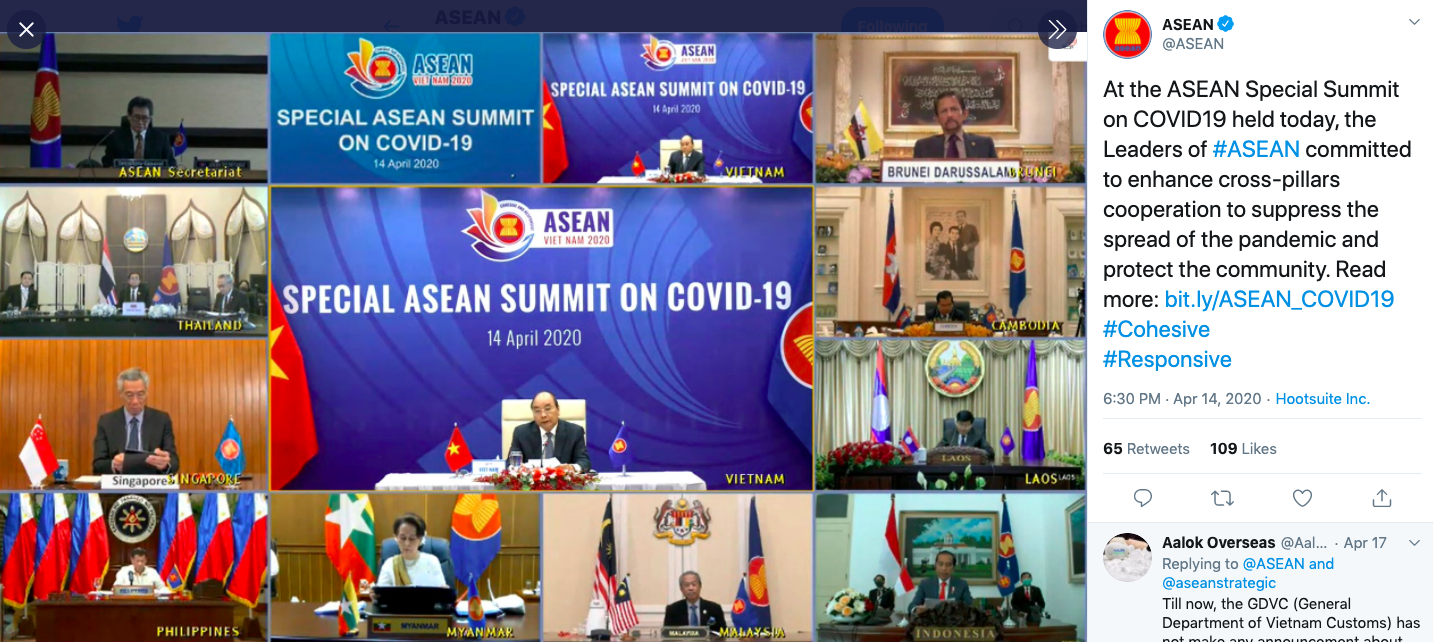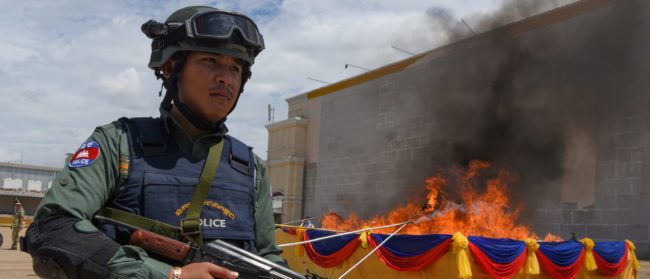Last month, the Sydney Morning Herald’s international editor Peter Hartcher was asked on-air by Australia’s national broadcaster for his take on ASEAN’s response to the Covid-19 pandemic. He didn’t mince his words.
“ASEAN has often talked a great game, but it has never successfully brought together a coordinated response to any major crisis,” Hartcher said. “Whether it was the Asian financial crisis, or territorial disputes in the South China Sea, it’s proved seemingly unable to coordinate and marshal its forces.”
This is not to say ASEAN as an institution has been absent while member states have engaged with the trials and tribulations that the pandemic has thrown up. On 14 April, it held a video conference summit between the 10 member heads of state to discuss how they could tackle the pandemic together, but apart.
Chairing the summit was Vietnam’s prime minister, Nguyen Xuan Phuc, who attempted to evoke unity. “It is in these grim hours that the solidarity of the ASEAN community shines like a beacon in the dark,” the premier announced.
The summit’s declaration echoed the sentiments of Prime Minister Phuc, outlining the agreement to imbue ASEAN’s response with enhanced collectivism.
On top of promises to remain united and to take collective action, the declaration also thrashed out details to tackle the virus. It called for an intensification in the “cooperation for adequate provision of medicines, essential medical supplies and equipment”, which member states were able to fund through the proposed establishment of a Covid-19 ASEAN Response Fund. Full funding details, however, remain vague.
Jessica Wau, assistant director (ASEAN) at the Singapore Institute of International Affairs (SIIA), told the Globe that it seemed as if the body was taking steps towards achieving a united response.
“One saw a stronger consensus emerging within ASEAN, as member states recognised the urgency to coordinate and collaborate in the fight against Covid-19,” Wau said. “There was a common theme from ASEAN leaders to bolster health cooperation measures, share information, and keep supply chains open.”
Point 8 of the bloc’s declaration called for “further enhancement of a caring and sharing ASEAN community”. The following point recommended a strengthening of “public health cooperation measures to contain the pandemic and protect the people”. This included exchange of information, sharing of experiences and the facilitation of “joint research and development of vaccines and antiviral medicines and a commitment to take collective action and coordinate policies”.

Cambodia’s Prime Minister Hun Sen also called for increased cooperation at the summit, fearing the region could struggle to control the virus if not. “The containment of this disease cannot be done within one country,” he said. “The success in fighting Covid-19 requires in-depth and comprehensive cooperation across sectors – ASEAN has to unite together in fighting Covid-19 as a common cause.”
With a history of divided responses to regionally important issues, precedent would suggest that it is easier, however, for ASEAN to commit words to paper than executing them in practice.
At the time of writing, the Covid-19 figures for ASEAN member states represent a patchwork of success and struggle, of zero deaths in Vietnam but second spikes in Singapore and swamped healthcare systems in the Philippines. And while ASEAN’s commitment to a unified front has been reaffirmed, the fight against the virus has been left to countries forging their own path.
This national individualism was observed on March 19, when Vietnam unilaterally shut its borders with Cambodia and Laos to curb the spread of the virus, provoking Prime Minister Hun Sen to then declare a day later that Cambodia’s borders with Vietnam were also closed. Though Hun Sen claimed the move was “not a response to Vietnam’s closure of its border with us”, many observers interpreted it as a tit-for-tat move.
Vietnam’s actions abruptly and severely curtailed much cross-border business activity between the two nations, and further hurt an already fragile Cambodian economy rocked by the global economic crisis.
However, praise for Vietnam’s robust and early response is growing globally, with only 312 recorded cases and zero deaths as of 15 May. Vietnam’s response illustrates the speed and effectiveness of states unilaterally setting early measures to defeat the virus, in ways in which ASEAN as a collective could not.
Hoang Thi Ha, the lead researcher in political & security affairs at the ISEAS-Yusof Ishak Institute in Singapore does not question the legitimacy of the measures taken by member states like Vietnam for the well-being of their citizens, explaining that ASEAN initiatives were never designed to replace domestic legislation.
“ASEAN is meant to manage and overcome borders, not to replace them; and regional cooperation is to complement, not to supplant national action,” she said. “However, the value of raising the ASEAN flag high is to make sure that while exercising national responsibility, member states should not indulge in national selfishness – they should keep in mind the larger picture of regional resilience to boost their own national well-being.”
But Hoang also cautioned that a “unified response from ASEAN remains more in rhetoric than in reality, and in form rather than in substance”, adding that she believes a more coordinated approach would have been beneficial at the start of the pandemic.
“Between January and February, not all ASEAN countries shared the same risk assessment or the same level of transparency regarding the outbreak, hence their disjointed and uneven responses to Covid-19 in its early stages,” she explained. “When the outbreak loomed larger in early March, emergency measures like lockdowns were imposed with little time and effort for consultation and coordination with ASEAN neighbours.”
Hoang stated there should have been a common ASEAN benchmark of pandemic risks, or an ASEAN-wide early warning system that could trigger region-wide preventive measures.
Almost all of the countries in ASEAN have taken a nationalistic approach, over a prosper-by-neighbour approach … The approach has been; ‘my country first, ASEAN second’
Charles Santiago, Malaysian MP and APHR chairperson
Charles Santiago, Malaysian MP and chairperson of the ASEAN Parliamentarians for Human Rights (APHR), told the Globe that many member states have put national interests ahead of regional wellbeing.
“Almost all of the countries in ASEAN have taken a nationalistic approach, over a prosper-by-neighbour approach,” he said. “The approach has been; ‘my country first, ASEAN second.’”
Santiago said that the organisation has been playing catch up. “There has been talk and talk and talk – yet nothing concrete has really emerged out of ASEAN,” he said. “They’ve been playing catchup, as opposed to developing a proper regional response and when something did emerge, it was too late in the day.”
One of the pandemic issues that has become increasingly acute within ASEAN is the provisions for intra-continental migrant workflows between member states.
“Because of how open the borders are and the extent of migrant exchange within the region, you would have thought that ASEAN would have risen to the occasion,” Santiago said. “You have nations with high numbers of migrant workers, from around ASEAN, and there needs to be some urgent discussions on how to protect them.”
The discussion, ultimately, around the effectiveness or even existence of an ASEAN regional response should be seen in the context of what the intergovernmental organisation was designed to do, as well as the nature of the virus.
“It is unrealistic to expect ASEAN member states to act as one, given the great diversity among them and the outbreak’s unpredictable trajectory,” said Hoang.
She explained that it would be more apt to have hoped for a ‘coordinated’ ASEAN response, rather than asking for an ‘unified’, as one might expect of the European Union in light of its founding principle of enhancing “economic, social and territorial cohesion and solidarity” among member states.
“The way ASEAN is structured, it is simply just not equipped to deal with such events,” said Santiago. “It’s dissimilar to the European Union, where you have a centralised body. ASEAN is not structured in such a way to respond like issues such as this.”


